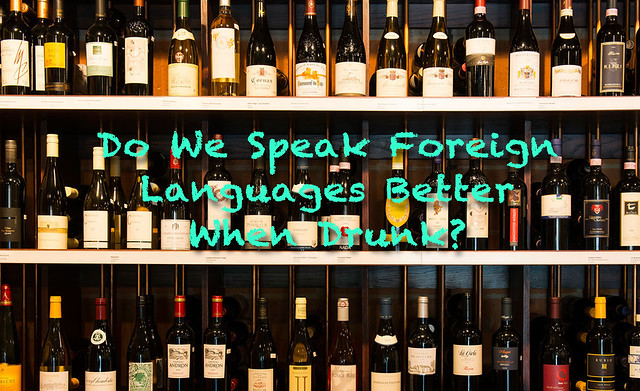常常可以聽到語言學習者說他們喝得酩酊大醉時,反而可以把外語說的更流利。他們似乎認為酒精飲用與外語口語能力有直接的關連。這種說法背後到底有什麼科學理論呢?
已知的是酒醉狀態實際上對我們的學習及記憶能力有負面影響,因海馬迴(hippocampus)無法正常作用。海馬迴是大腦記憶系統中不可或缺的一部份。但另一方面,儘管酒醉會造成虛幻的感覺,有些飲酒造成的負面作用似乎能增加學習及記憶能力。舉例來說,被深度催眠的人,在學習上能夠比那些催眠程度較低的人,表現更佳。
所以飲酒能使外語說得更好,到底是怎麼一回事?實情是,當我們喝醉時, 情感過濾(affective filter)的功用會降低。換句話說就是我們會把大部分原有的矜持跟擔憂拋之腦後。因為原有的阻礙不復存在,我們就會在不講究文法規則、不擔心犯錯的情況下,以較為放鬆的態度,趴哩啪啦地說著外語。
但是可別急著把Jack Daniels威士忌當作語言學習的秘方!這個方法有兩個壞處。
第一點,雖然你變得比較有信心開口,而且可以說得很流暢,但是你也會犯更多的文法跟發音錯誤,而且可能會造成連清醒時都改正不來的錯誤。
第二個壞處是酒醉時那種信心滿滿(或說得一口流利外語)的狀態,都不持久。如果依賴酒精當外語溝通的主要促進劑的話,那到最後你可能會要靠酒精來精通外語了!
最重要的一點是,酒精對流利外語口說帶來的正面影響,其實不完全歸功於酒精。實際上只是你對自己的語言能力產生信心。藉由口說練習或信心建立的學習系統增進語言能力,會有大過豪飲伏特加或威士忌的成效。
資料來源:Speaking Alcohol: Do We Speak Foreign Languages Better When Drunk? [13 APRIL 2011]
全文摘自PanSci泛科學網
原文:
It is common to hear foreign language learners say that they are able to speak more fluently when in a state of inebriation. They seem to identify a direct relationship between alcohol consumption and their ability to speak a certain language.
It makes you wonder: is there any scientific evidence is there to back this up?
One thing we do know is that drunken states are often actually detrimental to one’s learning and memory abilities by inhibiting the proper functioning of the hippocampus, an integral part of the brain’s memory system. On the other hand, some types of seemingly debilitating states have been shown to increase learning and memory despite their seemingly illusory effects. For example, people under deep hypnosis have been shown to perform better on learning tasks than people who have undergone lesser types of hypnosis.
Why do we Speak Foreign Languages Better When Drunk?
So what exactly might be happening when you’re drinking that helps you speak foreign languages better? Well, in our state of drunken debauchery, we lower our affective filter. In other words, we tend to lose many of our inhibitions and worries. As a result of this decrease in inhibitions, we also tend to worry less about the grammatical rules and possible mistakes we can incur in and we adopt a more relaxed attitude towards verbal communication, thereby resulting in a more fluid stream of words out of our mouths.
But don’t go running for a bottle of Jack Daniels as your language-improvement solution just yet! There are two major downsides to this strategy. The first is that despite your increased confidence and fluidity, you are also likely to make many more grammatical and pronunciation errors, and perhaps even ingraining bad habits that will persist back into sobriety.
The second downside is that any improvements in confidence/fluidity that may be experienced while drunk are unfortunately short-lived. If you rely on alcohol as your primary facilitator of communication, than you might end up resorting to alcoholism to master your language of preference! Not a good plan.
The important lesson to learn here is that the seemingly positive effects of alcohol on foreign language fluency are not due to alcohol at all. They are due to confidence in your skills. If you build confidence by practicing speaking and use a confidence-based learning system such as Brainscape, you’ll experience much better improvements in your language skills than you would from a bottle of vodka or whiskey.





